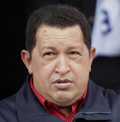New York, May 29, 2009–President Hugo Chávez Frías is damaging Venezuelan democracy by continuing to threaten private media with reprisals and making unwarranted accusations against the press, the Committee to Protect Journalists said today.

On Thursday, Chávez demanded that Attorney General Luisa Ortega Díaz, Minister of Public Works and Housing Diosdado Cabello, and the Supreme Tribunal of Justice take action against media that “poison” Venezuela, according to local press reports. If the officials do not, they should resign, Chávez said on his radio and television show, “Aló Presidente.”
“Carry out your duty–that’s why you are there; otherwise resign and let someone with courage take over,” Chávez said during the broadcast, part of a four-day series marking the show’s 10th anniversary, according to press reports. The president repeated a previously stated, but unsupported accusation that media wants to “incite” his murder.
Chávez’s comments come just three weeks after the National Telecommunications Commission (CONATEL) announced that it had opened an investigation into the private broadcaster Globovisión for allegedly “inciting panic and anxiety in the population” following a May 4 report on an earthquake that shook Caracas. Globovisión was the first outlet to report on the 5.4 magnitude quake. Minister Cabello heads CONATEL.
“By threatening direct action against the media, President Chávez is overstepping his authority and ratcheting up his efforts to stifle dissent,” said CPJ Americas Senior Program Coordinator Carlos Lauría. “We call on Chávez to put an end to this systematic campaign of harassment against the media by showing tolerance to ideas and opinions that oppose the views of his government.”
Chávez has used his office before to silence a broadcaster. In 2007, he pushed CONATEL to strip RCTV, the country’s oldest private television network, of its license to use the public airwaves. Now known as RCTV International, the station is available today only as a paid subscription service on cable and satellite. On Thursday, the president alluded to the RCTV decision, saying, “If what has to happen does not happen in the correct institutions then I will have to act like I have had on previous occasions.”
Globovisión faces two other administrative proceedings. In November 2008, CONATEL began investigating the broadcaster on charges of violating the Law of Social Responsibility after the station aired a victory speech by an opposition gubernatorial candidate before the results were officially announced. In a press conference a day after the election, Chávez ordered CONATEL to “severely discipline” the broadcaster for airing election results prior to official confirmation.
A month before, CONATEL had initiated a proceeding against Globovisión after the station broadcast comments by journalist and presidential critic Rafael Poleo, director of the daily El Nuevo País, who said Chávez “could end up like Mussolini.” CONATEL said Poleo’s commentary violated the Law on Social Responsibility.
Known for its strident antigovernment views, Globovisón is the only critical television station left on the public airwaves. Globovisón’s programming can be viewed in metropolitan Caracas and the state of Carabobo. The other remaining private networks, Televén and Venevisión, have eased their critical reporting in recent years.